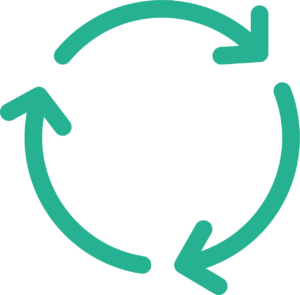Whether you are an individual or a business, the 6Rs Framework is useful to eliminate plastic and waste from your life. If recycling is usually considered as a top solution for circular waste management, in the 6Rs framework, it is the last resort. Indeed, refusing, reducing, replacing and reusing should be prioritized. Readers should note that I have added one R (Replace) to the 5Rs framework created by Bea Johnson.
1. Refuse

Refuse is the first of the 6Rs principle. This powerful habit helps eliminate a lot of waste. For example, you can say “no” to free samples, or to plastic straws in your glass. It is important to train yourself saying no without the fear of being judged and of offending.
2. Reduce

This principle is useful as well to eliminate plastic, and more generally, waste from your life. Reducing the quantity or frequency of use is not only an opportunity to save money, but also the planet. When you’re at the purchasing point, you can ask yourself: “do I really need it?”, “maybe I need less of it”, or “maybe I can use it less often”.
3. Replace

I have added this principle to the 5Rs framework because I found it useful to eliminate plastic. When you’re in a store or a grocery shop, have a look around you, you might find the same product yet non-packed in plastic. If there are no plastic alternatives, try to find a substitute, or learn how to make it yourself. For example, you can:
- Buy yogurts in a glass pot,
- Even better, make your own yogurts,
- Use aloe vera plant instead of a cream,
- Make your own grated cheese.
4. Reuse

You can learn to reuse products/goods, and make it a habit:
- Why trash this plastic cream pot, when it could be repurposed for cosmetics that you can make yourself?
- Why trash the yogurt or honey glass pot, when both could be repurposed as well to store loose goods?
- Why buy a new computer or smartphone, when it could be repaired to extend its life, or even when you can buy one secondhand?
5. Recycle

Recycling should also become a habit in your life. Waste is a resource; especially glass, cardboard, metals and textiles. Beyond sorting your waste, you can also downcycle many objects found in your home. For example:
- Old textiles can be used to make sponge,
- Old textiles can also be used to make your own bee wrap.
6. Rot

Organic matter needs to be returned to the soil instead of being incinerated. Composting organic waste helps store carbon in the soil, maintain soil’s life and produce natural fertilizers. Also, peelings can be used for cosmetics or households and seeds can be planted to have nice plants at home.
Did you find this article insightful? Leave a comment.




